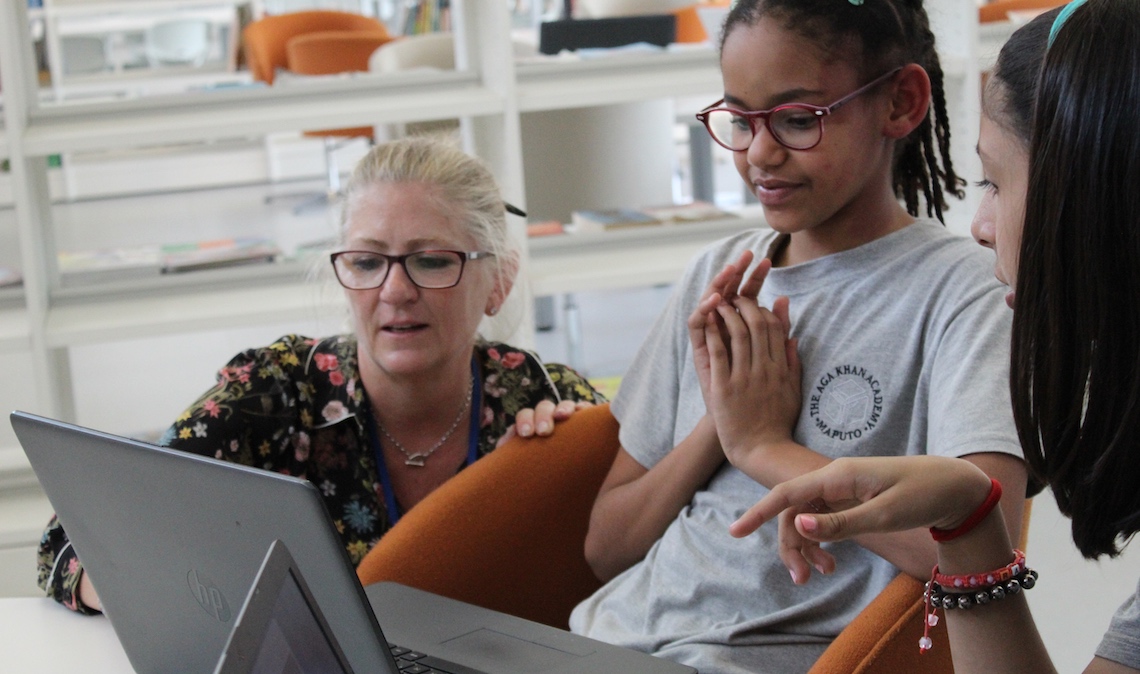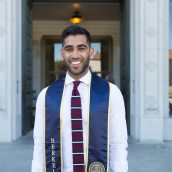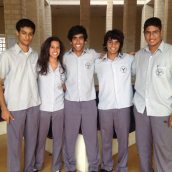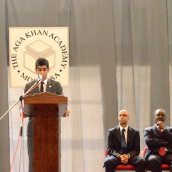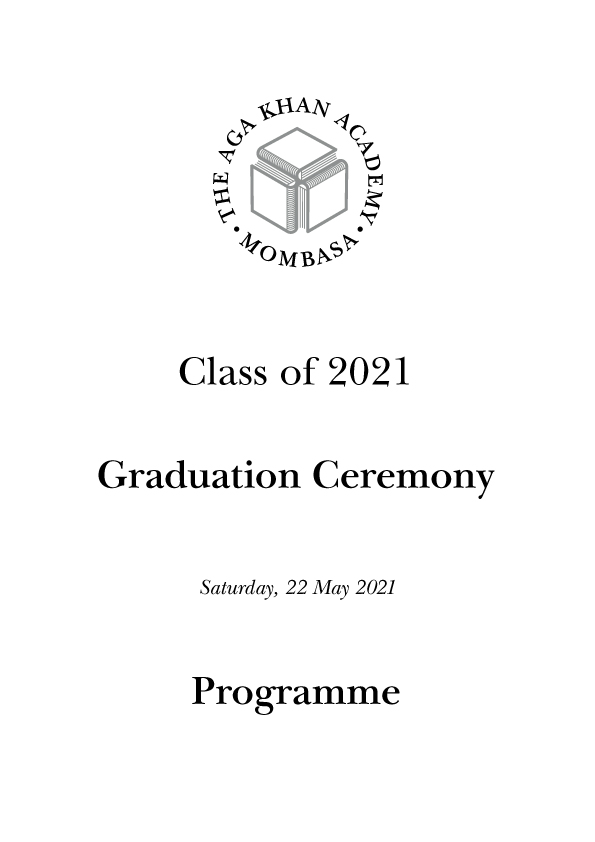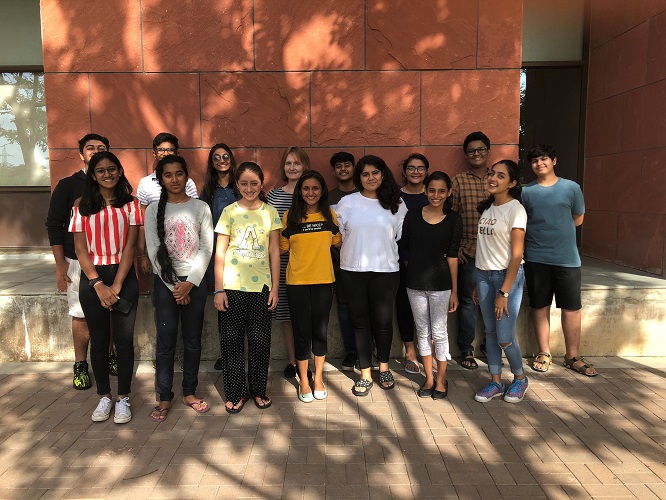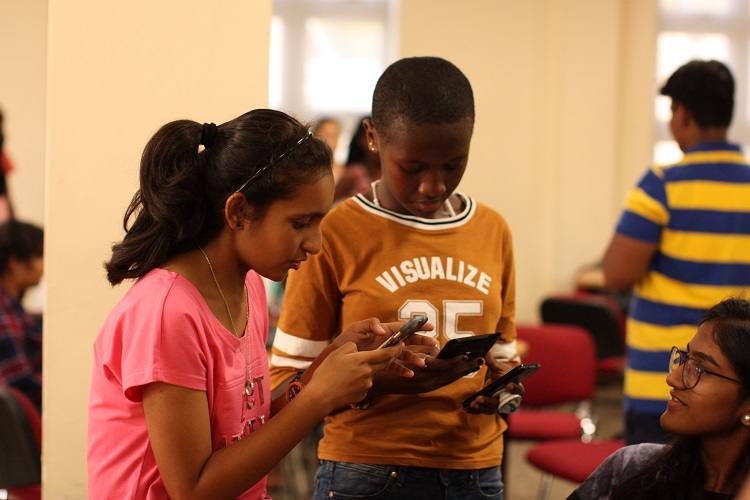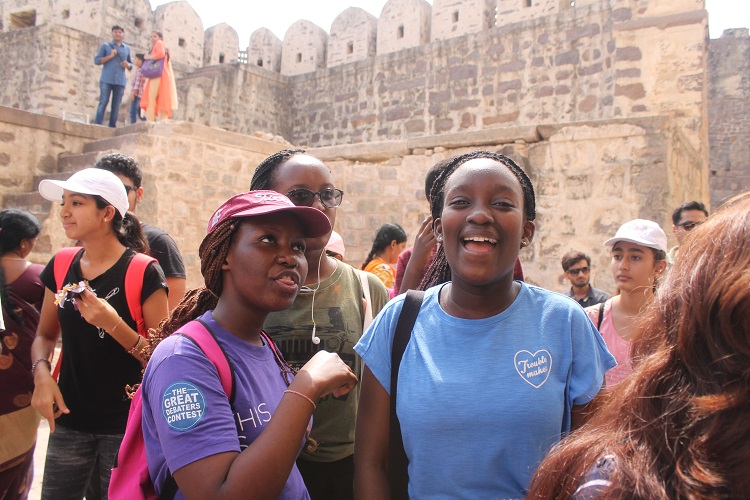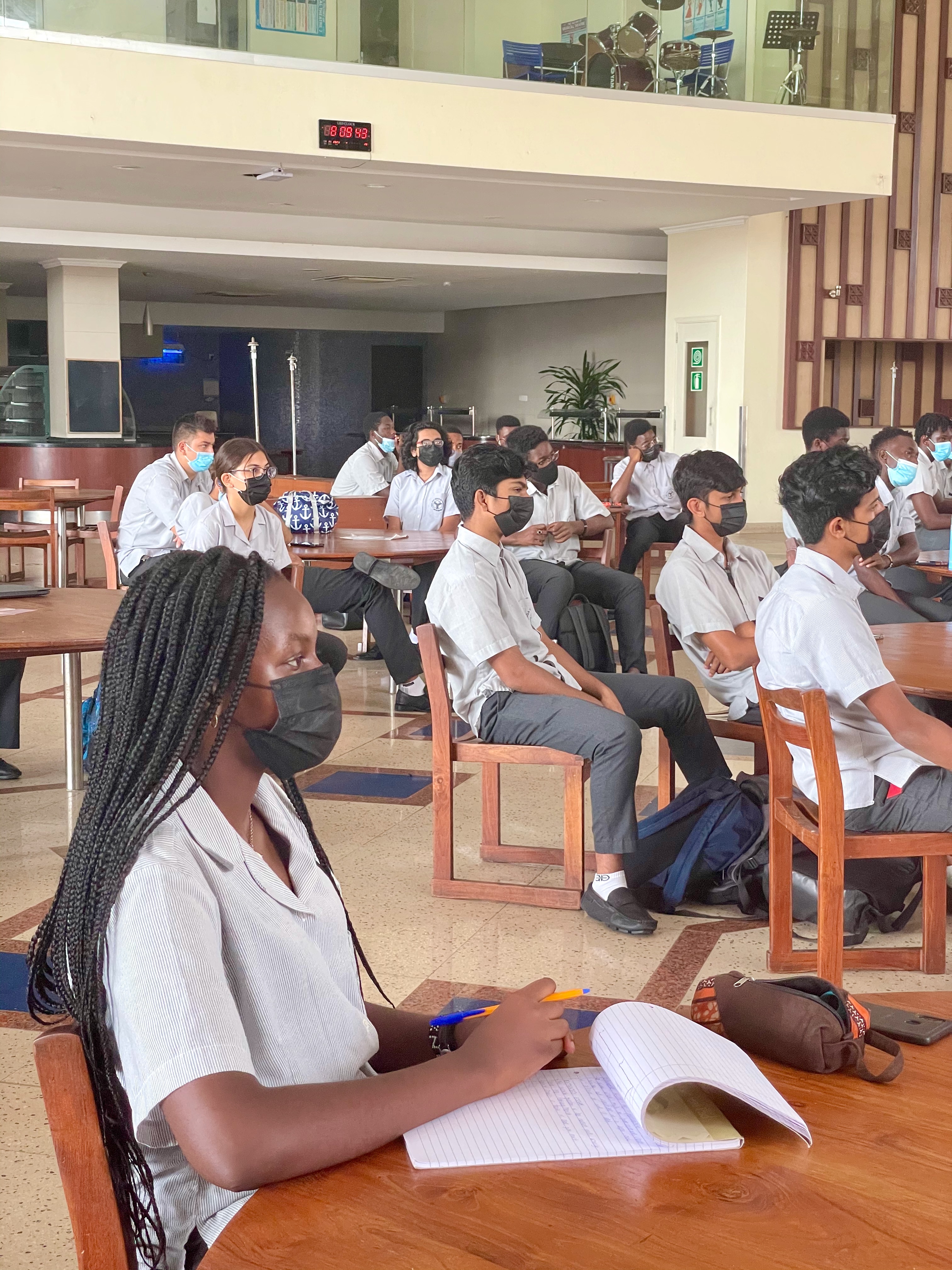Rebecca Nichols: Seeing Endless Possibilities for the Future of AKA Maputo
Engaging Students to Become Stake-Holders in the Future of the Academy
For the Middle Years Programme (MYP) Coordinator, Rebecca Nichols, the sky is the limit when envisaging the future of the Aga Khan Academy in Maputo, Mozambique. More importantly, in her eyes, how the Academy keeps growing, shaping and expanding its role in the country and beyond must lie in the hands of students.
“I would like to see our students take responsibility for what our school should become,” she states with excitement, squarely placing the emphasis on student-centred leadership. “I look forward to hearing their ideas for new initiatives, and I look forward to AKA Maputo becoming a school on the African continent from which leaders emerge,” she adds with resolute clarity.
Listening to the details of Rebecca’s background, education, and experience is highly entrancing. Born in the United Kingdom, she spent the early years of her life in Kenya before moving to the Ashanti Goldfields in Ghana for a few years and then back to Great Britain where she obtained her university-level education.
Armed with Master’s Degree in Education from the University of Bath and a post-graduate certificate in Education from the University of Sheffield, Rebecca has taught schools in Portugal, Angola, Kenya, Sweden, Spain, Italy and Hong Kong. In addition, she has worked as an International Baccalaureate (IB) Diploma examiner, an MYP workshop leader and an independent educational consultant for schools in various parts of the world. She is currently pursuing a Doctorate Degree in Education. A British citizen, Rebecca says of her background, I think of myself as a transcultural, rather than someone who identifies particularly with the UK.”
The Academy’s IB Programme is rich in Curricular Strands of ethics, pluralism, economics for development, cultures, governance, and civil society. These play a vital role in Rebecca’s teaching as she incorporates them in her instruction.
“I teach English language and literature and am always able to explore texts and language through the lens of the IB Programme’s Curricular strands,” she notes. “Currently, some of my grade 6 and grade 7 students and are studying Shakespeare’s ‘The Tempest,” and we have explored the themes of governance and civil society in the play.”
Mutual respect and mutual trust between students and also between students and teachers are of paramount value for a thriving classroom. How does Rebecca ensure that this environment exists in her classroom?
“By listening to one another. By supporting one another. By helping one another reach their potential.”
Recognising the importance the Academy attaches to incorporating pluralism and the one-family feeling in the school, Rebecca states of the teachers, “We do a lot of work on team- building activities and also try to engage our students in undertakings that will enable them to develop a sense of community, a sense of family.”
Students, too, participate in this responsibility of developing a sense of belonging. “Our students have set up an after-school programme called “Teen Talks” that enables them to discuss their feelings, experiences and, concerns,” Rebecca says. “Their openness to one another ensures that a climate of pluralism flourishes within the Academy.”
Although Rebecca values her students and works hard to educate them, she feels an excellent education must involve parents. “Any outstanding education must involve three parties; the students, the parents/guardians and the teachers,” Rebecca is quick to note. “I communicate a lot with parents through monthly coffee mornings, emails and events to which parents are invited. I especially look forward to the parent-teacher conferences.”
Radiating ambition for her students to become independent thinkers, even while working in groups, Rebecca designs projects that foster independent thinking skills.
“I create exciting, relevant units of work that expose them to a range of language and literature from a variety of contexts,” she states. I encourage them to be creative, to work independently, in pairs and as part of a group. I provide detailed feedback and expect students to be able to provide meaningful feedback to one another,” she pauses. And then continues, “I encourage them to take risks, to read widely and to learn about the world beyond our campus fences. I encourage them to try things they have never done before.”
Cherishing her time at the Academy, Rebecca feels the experience she is acquiring will continue to resonate with her throughout her life. “Working at the Academy has enabled me to become a more effective multitasker who is willing and able to take on a wide variety of roles that support teaching and learning,” she muses. “I believe that this is an exciting time for the Academy and look forward to being part of the journey.”
Activities and Clubs
After School Activities starts from 13 Feb 2018. Please note after school activities are only for students from KG3 up to Grade 7. Início das Actividades Extra Curriculares - 13 de Fev 2018. As actividades extra curriculares são osras os alunos do Pré-3 ao 7° Ano.
Rahim Daya (Class of 2013): Grateful for a balanced education
Growing up in London, England I had no idea that I would owe my intellectual and character development to the dynamic academic and residential programmes at the Aga Khan Academy Mombasa.
I was aware of the work of the Aga Khan Development Network and their efforts to improve the quality of life of communities across the globe, but little more. After moving from London to Moscow at age 12, my parents urged me to consider the programme at the Aga Khan Academy Mombasa, a school 5000 miles away. I was taken aback. Why did they want to send me away? I didn’t mean to knock over the photo frame while kicking around the soccer ball the other day. As I began to read about the Academies and their vision to create leaders, I became excited at the prospect of being part of a rigorous academic programme while having the opportunity to engage in the numerous extra-curricular activities the Academy in Mombasa had to offer.
I was one of the first members of the boarding component of the Academy and, as a result, I saw the programme grow from about 30 students living in two blocks to almost 200 across six blocks. Despite the growth, residential students remained a tight-knit community where younger students felt comfortable interacting with student several grades above them. The commitment to serve the community was of the upmost importance within residential life at the Academy. I recall taking part in cleaning Mama Ngina Drive, the street that ran adjacent to the school, as well as numerous beach clean ups, painting a local madrasa and facilitating a de-worming programme in Bombolulu to name a few. Students were also given the freedom to create their own community service projects. I was a part of a project called Your Environmental Voice, an organisation that aimed to create awareness of environmental issues and undertake initiatives to curb unnecessary pollution in Mombasa. Projects like these allowed for students to lead and take ownership of projects that made a difference in the lives of those around us.
Within the residential programme, I recall the efforts of teachers like Mr. Bernard Dudi – my dorm parent for the majority of my time at the Academy – and others who went out of their way to ensure that students quickly settled into the Academy. Teachers’ doors were always open for a quick chat on academics, current affairs and future plans as well as the results from the previous nights’ Champions League football. In holding the position of dorm captain within the residential community and representing the community on the student council, I was entrusted with a leadership role within residential life that involved organising and facilitating orientation programmes for new students. In addition, dorm captains arranged activities for students on the weekends and liaised with students and teachers to improve the boarding experience for all. Leadership roles like this gave me my first taste of managing projects and people and I continue to draw on these experiences today.
Being a part of and leading the Model United Nations club at the Academy in Mombasa was an experience that I hold most dear. At first, the thought of public speaking and writing resolutions to combat real local, regional and international problems was intimidating enough for me to turn a blind eye to joining the club. However after encouragement from teachers and peers, it wasn't long before I began to gain confidence in addressing long hundreds of fellow delegates without needing to read off a script or feel my legs wobble. Through attending conferences as well as teaching others the skills needed to be a successful delegate, I was tasked with analysing and working with others to construct creative solutions to tackle issues concerning poverty reduction including food security; the prevalence of quality educational institutions; access to clean water and sanitation. These experiences allowed me to begin to comprehend the multiple complexities to a single issue and the ethical responsibility we carry to do all in our power to promote sustainable progress in less privileged communities.
I was particularly challenged by the rigor of the IB Diploma Programme – I quickly learnt that it is essential for students to be able to think independently and work hard to engage with thought provoking course work. Studying six different subjects as well as Theory of Knowledge and writing a 4000-word essay on a chosen topic was a heavy load to bear. Crucially, there was a willingness and determination among the student body to study in groups and push one another to achieve challenging objectives. There was no shame in going to a classmate or more senior students to ask for help and this was in fact commonplace. I think that the challenge of the IB diploma was made much easier by the effort to work together among students. The teachers at the Academy were invaluable in the process as they guided students to reach the academic goals and encouraged students to think outside the box. Their collective love for teaching and determination to see students succeed allowed for the attainment of consistently high grades and development of a passion for learning that continues to drive Academy alumni today.
As I reflect on my time at the Academy and turn an eye to the future it is my hope that I will be able to return to the African continent and help to contribute to the progress being made today. Graduating with a liberal arts education from UC Berkeley and focusing on Political Economy from an African lens has cemented the responsibility I feel to give back to communities and help improve the lives of those troubled by poverty, unemployment and poor governance. Not only did my time at the Academy help me gain admission to a top university but it helped me to grow to be the man I am today by instilling values of social conscience and intellectual curiosity that I continue to hold precious today.
By Rahim Daya
Golden Girl Emily Muteti Glows
The Daily Nation reports on the Coast Amateur Swimming Association (CASA) Championship which took place on 11th-12th February at the Aga Khan Academy Mombasa.

